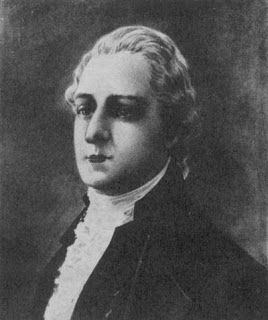[Dr. Benjamin Church to Samuel Adams]
“Sunday Evening Sept 4th 1774
Dear Sir:
Having closed my former letter, Further Intelligence coming to hand I seize a leisure minute to give it [to] you. Mr. Stearns just arrived from Paxtons informs me that the Inhabitants of Springfield, Leicester Paxton Spencer and the Towns adjacent had risen in one body armed & equipped and had proceeded on their march as far as Shrewsbury on their way to Boston to a Number of twenty thousand and were with difficulty persuaded to return and would not until [ ] Passengers from this way they were convinced that there was no necessity for their assistance at this time. I likewise must inform you that I this afternoon was eccosted by one Cap.t McNeal from Ireland who gave me the following Intelligence, that a number of friends in England were determined to send us over a quantity of Woolen Cloths to cloath the Poor of Boston this Winter and also assured me that 3 or 4 sail of Goods would be freighted from Cork and Dublin with Beef, Pork, Wheat, Flour, Butter &c for the relief of this Town – Peter Oliver says he will act no longer as Chief Justice, looks upon the Congress as a good measure, and believes they will be the Salvation of America – this you may depend upon – Even the Army look to you for relief: a Capt. of one of their regiments told me it was their Wish & Expectation that you would frame such a Bill of Rights as might settle the matter upon an equitable foundation – and farther undertook to assure me that he was satisfied from what he had heard from his Friends in England that were a Committee appointed from your Body [i.e., the Continental Congress] consisting of 6 or 8 favorable Gentlemen to repair to the Court of Britain as Delegates or Commissioners from all the Colonies with proper powers to settle the Controversy between Britain & us, they would be attended to for Britain began to be heartily tired of the Dispute. I answered that Britain had paid no attention t our agent, pleading informality in his appertainment such a Commission would be liable to the same exceptions – They would not go as Petitioners because their Petitions had been so frequently rejected that it would be absurd & bare to attempt to gain upon his majesty in that way, and moreover that there was an act of humiliation prerequisite which to his Lord North: feels which the Spirit of the Colony would never submit to, upon the whole we had no measures to pursue but t resist force to force if Great Britain was inclined to m[ ]iate the minds of the Colonists, & seen as their affections which she had alienated by her Cruelty & Injustice she must take the next advances to a Reconciliation . he looked disappointed, and as he had attended himself upon me, suddenly & complaisantly took his Leave – this I thought worth noting.
Yrs. Sincerely & affectionately
Ben Church Jr”
Source: Samuel Adams Papers, 1635-1826, mss at New York Public Library, Rare Books and Manuscripts, Bancroft Collection. This is my transcription from the microfilm version by Scholarly Resources, Inc., Roll 1. Internal reference indicates that this is the second, and only surviving, letter of this date written by Benjamin Church at Boston to Samuel Adams, then in Philadelphia.
Commentary: The duplicitous doctor’s report concerning the Cambridge Alarm is quite unlike Dr. Warren’s or Young’s. Church writes that acerbic Loyalist Peter Oliver likes the idea of a Provincial Congress, a convoy of relief supplies was imminent from Ireland, and that an overture for reconciliation with Britain was related to him informally. In light of later allegations, we wonder if Dr. Church was on a dis-information campaign or some other nefarious scheme. This letter is rarely cited even by apologists for the first American traitor.
Correspondent Samuel Adams was the senior member of the Massachusetts delegation to the impending First Continental Congress. Letters by Dr. Joseph Warren and Thomas Young carrying the same September 4th date, were all written in haste for posting by an express rider about to depart for Philadelphia. Variously in their overlapping capacities as long time Sons of Liberty, members of the Boston Committee of Correspondence, and (for Warren and Church) elected delegates to the Suffolk Convention; Drs. Church, Warren, and Young endeavored to keep the Massachusetts Continental Congress representatives closely informed of the Cambridge Alarm and dramatic events of early September 1774. Patriots in the Massachusetts countryside had effectively upended Royal authority in Massachusetts outside of Boston and were ready to assert a Revolutionary government, more radical and militant stances than Boston Patriots were then asserting.
The three letters addressed to Samuel Adams, all dated September 4, 1774 and written by his political proteges Drs. Warren, Young and Church, offer insights into their authors’ characters and contrasts among the Boston Patriot physicians. Joseph Warren’s letter reveals a decisive man of action, excitement with his playing a pivotal role, and close personal friendship with the elder Adams. Thomas Young is verbose, ideological, ingratiating, and self-centered in constantly relating situations to his immediate feelings. Dr. Church is gossipy and, applying a large dose of hindsight not shared by contemporaries, suspect both in the accuracy and purpose of information he conveys. Future biographers of Benjamin Church and Thomas Young would do well to analyze these letters closely.
Whatever their individual strengths and weaknesses, the Boston Sons of Liberty as a group proved to be one of the highest functioning and enduringly influential teams in American history.

 Follow
Follow